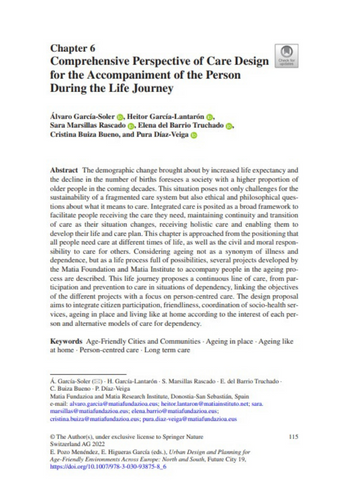A holistic view of care design for the support of the person throughout the life course

Pozo Menéndez, E., Higueras García, E. (eds). Urban Design and Planning for Age-Friendly Environments Across Europe: North and South. Future City, vol 19. Springer, Cham. https://doi.org/10.1007/978-3-030-93875-8_6
Demographic change brought about by increasing life expectancy and falling birth rates foresees a society with a higher proportion of older people in the coming decades. This situation raises not only challenges for the sustainability of a fragmented care system, but also ethical and philosophical questions about what it means to care. Integrated care is envisaged as a comprehensive framework for enabling people to receive the care they need, maintaining continuity and transition of care as their situation changes, receiving holistic care and enabling them to develop their life and care plan.
This chapter of the book "Urban design and planning for age-friendly environments across Europe: North and South. Development of healthy and therapeutic living spaces for local contexts", is approached from the position that all people need care at different moments of life, as well as the civil and moral responsibility to care for others. Considering ageing not as a synonym of illness and dependence, but as a life process full of possibilities, several projects developed by the Matia Foundation and the Matia Institute to accompany people in the ageing process are described. This path of life proposes a continuum of care, from participation and prevention to care in situations of dependency, linking the objectives of the different projects with a person-centred approach to care.
The design proposal aims to integrate citizen participation, friendliness, coordination of socio-health services, ageing in place and living at home according to the interests of each person and alternative models of care for dependency.






